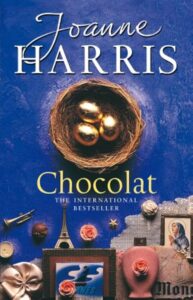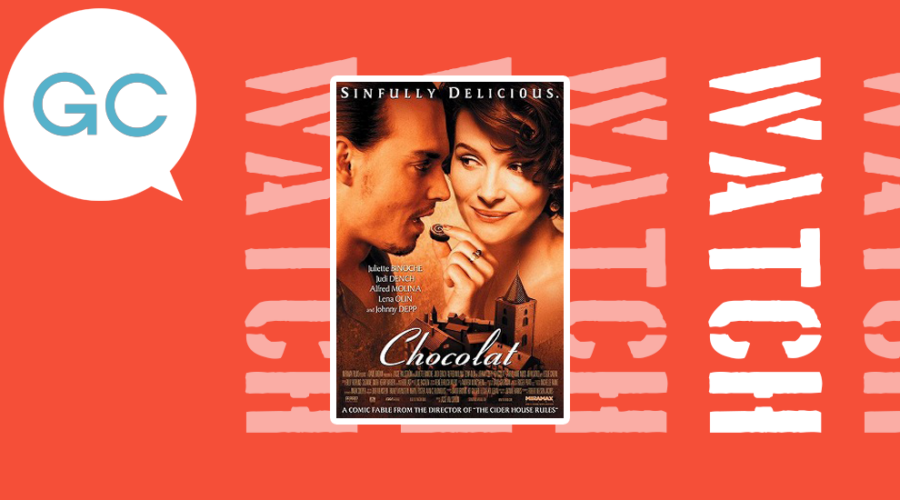Hi, and welcome to this month’s Great Adaptations, where we’re looking at the novel Chocolat by Joanne Harris and the 1990 film of the same name, starring Juliette Binoche, Johnny Depp and Dame Judi Dench.
Over at Five Books For this month I’ve been looking at magical realism, of which Chocolat is a great example. Books in this genre usually contain some sort of fantastical element or blur the line between reality and fantasy in some way, while still being very much set in the real world.
 Chocolat is set in the small French village of Lansquenet-sous-Tannes in the 1990s. Our protagonist Vianne Rocher is a single mother looking for a place to settle down after years of wandering. She and her daughter Anouk arrive in Lansquenet just as Lent is beginning and open a chocolaterie, defying the will of the local priest, Francis Reynaud, who fears that the temptation of worldly pleasures will distract his parishioners from their Lenten fasting, a practice he pursues obsessively.
Chocolat is set in the small French village of Lansquenet-sous-Tannes in the 1990s. Our protagonist Vianne Rocher is a single mother looking for a place to settle down after years of wandering. She and her daughter Anouk arrive in Lansquenet just as Lent is beginning and open a chocolaterie, defying the will of the local priest, Francis Reynaud, who fears that the temptation of worldly pleasures will distract his parishioners from their Lenten fasting, a practice he pursues obsessively.
The contrast between Reynaud’s asceticism and self-denial and the pleasure and indulgence that Vianne’s chocolaterie represents is one of the recurring motifs of the book.
As the story progresses, Reynaud’s initial disapproval of Vianne and all she seems to stand for turns into outright hostility when he realises that Vianne doesn’t attend church and holds to her own set of beliefs, which don’t align with his unsparing version of Christianity.
As Vianne builds relationships with the villagers and begins to put down roots, Reynaud’s opposition to her grows, and the arrival of a group of river gypsies becomes the fuel that brings tensions to a head, with terrible results.
On the surface, and certainly from watching the film or looking at the cover design, you’d be forgiven for thinking that this is a pleasant novel set in a beautiful part of rural France and a lovely way to pass a little time. And you wouldn’t be completely wrong, but you would be missing the dark undercurrent that runs through the novel, exposing people’s meanest thoughts and motivations and showing us their worst sides, even as they outwardly present themselves quite differently.
There are some great characters here who resist simplification – they do messy things, some of them are awful, and their motives are murky and impure. However, there are other examples of purer love, like the love Guillaume has for his dog Charly, who is dying. Reynaud is adamant that Charly has no soul (something that any dog lover knows is absolutely incorrect) and Harris uses this lack of empathy as the perfect illustration of Reynaud’s character.
One of the things I like most about the novel is the way that there’s hope amongst the darkness. The book explores some heavyweight themes including morality, good and evil, and the contrast between religious zealotry and spirituality, but it never feels heavy handed or overly simplified and while the ending isn’t neatly packaged, it leaves open room for possibility. There are in fact three more books featuring Vianne so ,if you enjoy the book, there is also the joy of having more time with the characters you love.
I was surprised how much had changed from the novel to the film – the changes work well but they make watching the film quite a different experience to reading the book.
When the film was released, it was described by Elvis Mitchell in the New York Times as “the feature-film version of milk chocolate: an art house movie for people who don’t like art house movies”, and I know what Mitchell was getting at – it does feel a bit arty, but still very accessible and easy to watch.
It’s also long enough (at two hours) to take a fairly meandering pace, avoiding building up too much tension and giving us plenty of time with the main characters.
The casting is astonishingly full of great actors – Dame Judi Dench, Juliette Binoche, and lots of other well-known character actors who bring a real depth of talent to the film. Dench in particular seems to be enjoying playing a grouchy old lady and Binoche has a grace and charm that is underpinned by a practicality that stops her interpretation of Vianne from being too fanciful or twee; especially notable given the makeover the story and various of the characters have received in comparison to the book.
The locations used in the film are beautiful and, while we get a few shots of the surrounding countryside or of the village from above, almost all of the action takes place in just a few spots: the chocolaterie, the church, Reynaud’s house and the river.
It really helps to illustrate the smallness of the villagers’ world and how confined they are, metaphorically.
The interiors are beautifully designed and visually the film is a real pleasure to watch, which I can’t help but feel is even more of an achievement given the limited scenery and locations used.
One major change from the book is that Reynaud is no longer a priest, but the town’s mayor and Comte, linked back to his ancestors who ejected the Huguenots in a neat bit of historical tying-in.
In this telling, he also happens to be a man whose wife has abandoned him but can’t admit it; instead he pretends she is travelling and merely extending her (surprisingly long) vacation whenever anyone enquires after her, which makes him much more sympathetic.
This clean-up job of the characters and their motivations continues across the board – they are almost all made more palatable for us. Caroline becomes a grieving widow, overprotective of her son after the death of her husband, rather than a grasping, greedy daughter waiting for her mother to die so that she can claim her inheritance. Roux, played by Johnny Depp, loses all his rough edges and temper and instead becomes the personification of flirtatious charm, a strangely one-dimensional performance from Depp even in the face of abject prejudice from the villagers. It seems even stranger given that Depp has a relatively wide range and could surely have brought more to the role – in the book, Roux is one of the ‘good’ characters we’re encouraged to root for, so it seems odd to me that he seems so watered down and unengaging in the film.
Some of the characters recede into the background much more than they do in the book, which is a shame – Guillaume in particular springs to mind here – but at a two-hour running time I imagine they had to be pretty ruthless in terms of cutting.
There’s also very little of the magical realism of the book portrayed in the film. I can see why this would be the case; as readers, we only understand that Vianne uses magic because we hear her narrative voice – it’s never displayed outright even there, and it would be quite a different sort of film if it had been incorporated, and very difficult to pull off without making something more like Bewitched, rather than the pleasingly artistic romance that the film actually gives us.
One of the biggest plot changes is the romance element, which plays a much bigger (and differently plotted) role in the film compared to the book, and which allows for a much more conventional happy ending. It’s done well and blends seamlessly with the other changes so that none of the changes feel clunky or glaring.
This is a good example of an adaptation that keeps enough of the original material to feel satisfying but changes enough to make the new format work in a very different way to the original, which I think is a difficult balance to strike.
If you haven’t already, I think it’s worth reading the book before watching the film in this instance, so that you can get a fuller sense of what Harris was trying to achieve before settling down to savour the lighter version, which makes for a very pleasant way to spend a couple of hours.

